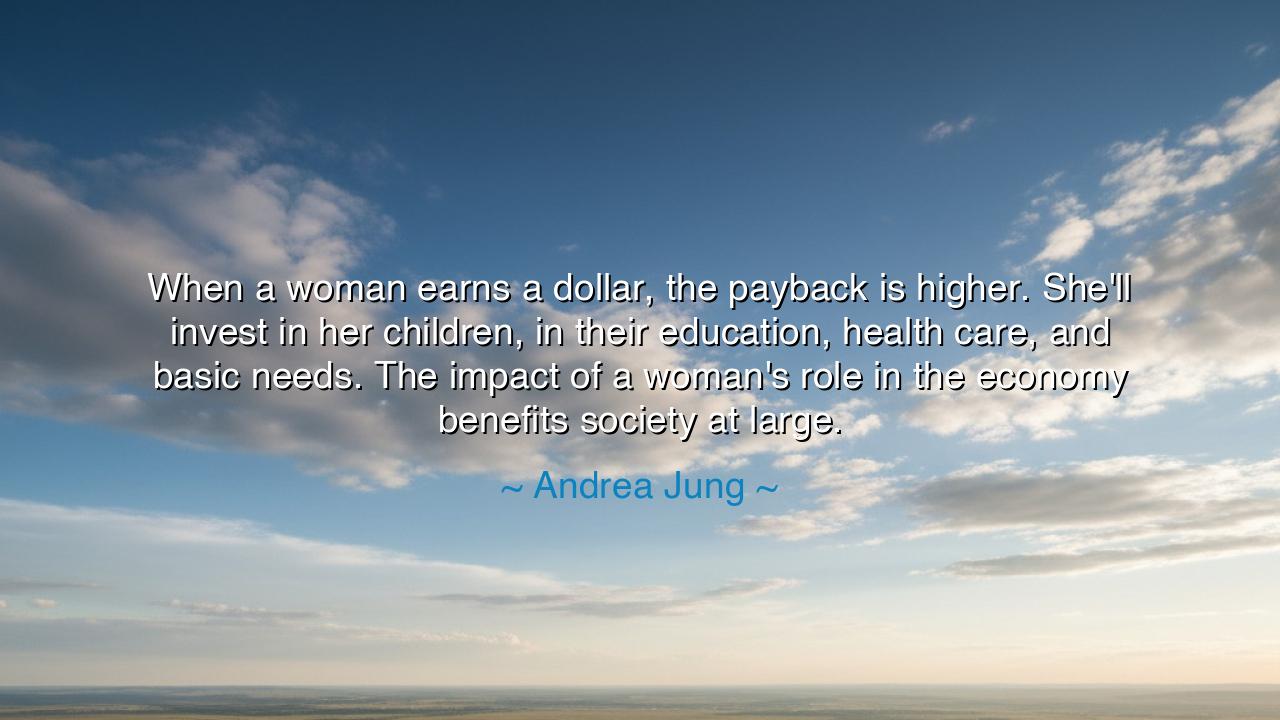
When a woman earns a dollar, the payback is higher. She'll invest
When a woman earns a dollar, the payback is higher. She'll invest in her children, in their education, health care, and basic needs. The impact of a woman's role in the economy benefits society at large.






In the realm of wisdom where economy meets the heart, Andrea Jung spoke a truth that transcends balance sheets and nations: “When a woman earns a dollar, the payback is higher. She’ll invest in her children, in their education, health care, and basic needs. The impact of a woman’s role in the economy benefits society at large.” These words, though born in the modern world of commerce, carry the timeless weight of moral and social truth. They remind us that the labor of women is not merely an act of survival—it is the quiet construction of civilization itself.
The origin of this insight lies in the witness of countless generations, though Andrea Jung, a leader in global business and former CEO of Avon, gave it voice through experience and observation. She saw with clarity what economists would later confirm: that when a woman gains financial power, her prosperity becomes the prosperity of all. Unlike wealth that gathers dust in vaults or vanity, hers circulates through the veins of the community—feeding, teaching, healing. Jung’s words arise from the recognition that the economic empowerment of women is not charity, but strategy; not a favor done to them, but a foundation laid for all.
The ancients, too, knew this truth, though they spoke it in the language of hearth and home. In the Book of Proverbs, the wise King Solomon described the virtuous woman who “rises while it is yet night” and provides for her household, trading and weaving with wisdom. Her strength, he said, brings honor to her city. So too, across centuries and continents, women have sustained nations through unseen labor—tilling fields, nursing the sick, teaching the young, weaving both cloth and culture. They have been the silent backbone of every thriving society, though history has too often written their names in whispers rather than in stone.
One need only look to the story of Grameen Bank in Bangladesh, founded by Muhammad Yunus, to see Jung’s words made flesh. When small loans were given to poor women who had never before held money of their own, entire villages were transformed. With a few coins, they bought seeds, livestock, tools. They sent their children to school, fed their families, and lifted their communities from despair. It was soon discovered that women, far more than men, repaid their loans and reinvested their earnings—not in themselves alone, but in the future. Here was proof of what Jung proclaimed: that a woman’s prosperity is communal prosperity, and that empowering her is the most powerful investment a society can make.
Her quote also shines light upon the injustice that still lingers: that in many lands, a woman’s dollar is harder to earn and smaller in value than a man’s. Yet despite this, her impact is greater, her discipline fiercer, her vision longer. This paradox should humble all who lead, for it reveals not only the resilience of women, but the blindness of systems that fail to honor their worth. When Jung speaks of higher payback, she does not refer to profit alone—she speaks of the multiplication of hope, of health restored, of minds awakened through learning, of cycles of poverty finally broken.
Let the wise take heed, then: if we would build nations that endure, we must build them upon the strength of women. Not merely as laborers, but as leaders. Not as caretakers only, but as creators of wealth, architects of progress, and stewards of future generations. The empowerment of women is not a battle of sexes—it is the mending of the world’s torn fabric, so that prosperity may flow equally through every thread.
Therefore, the lesson of Andrea Jung’s words is both simple and sacred: to invest in women is to invest in humanity. Teach your daughters to stand firm in knowledge and confidence. Support the mothers who build homes with both hands and hearts. Demand justice where wages and opportunities fall short. And remember that each coin placed in the hands of a woman is not spent—it is sown, yielding fruit in children who are educated, families who are nourished, and societies that thrive.
For when a woman earns, the world rises with her. Her work sustains not only her kin but the generations that follow. Let us, then, honor her not in speeches alone, but in action—in equal pay, equal access, and equal respect. For the day when every woman’s labor is valued rightly will be the day humanity finally begins to reap the fullness of its own strength.






AAdministratorAdministrator
Welcome, honored guests. Please leave a comment, we will respond soon